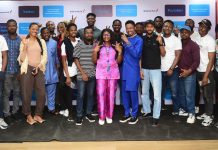Stanford Graduate School of Business (www.GSB.stanford.edu) (Stanford GSB) today announced a USD $3 million, three-year partnership with De Beers Group to empower young, budding entrepreneurs and owners of established businesses in Botswana, Namibia, and South Africa through two new educational programs launching in 2018.
Stanford is expanding two of its successful programs to Southern Africa: the Seed Transformation Program of the Stanford Institute for Innovation in Developing Economies, known as Stanford Seed (www.GSB.stanford.edu/seed), and the Stanford Go-to-Market (www.GSB.stanford.edu/programs/stanford-gotomarket-botswana) program for accelerating business ventures to market.
The two programs are:
- Seed Transformation Program, a one-year program of intensive sessions on topics such as leadership, strategy, business ethics, accounting, marketing, and value chain innovations. Skilled facilitators assist participants in applying classroom insights, developing leadership teams, and formulating a detailed plan for organizational transformation and growth. Seed facilitators also work with participants in carefully constructed leadership peer groups, offering networking opportunities, resources, and ideas to help implement the participants’ transformation plans. The mission of the program is to enable business owners to lead their regions to greater prosperity through the growth of their companies and job creation. The program will be open to owners of established businesses in Botswana, Namibia, and South Africa. Applications will be accepted 17 August through 6 October, 2017.
- Stanford Go-to-Market Program, an intensive, one-week entrepreneurship bootcamp, taught by Stanford GSB faculty, held in cities around the globe. Through a combination of lectures, case studies, and small-group discussions, the program helps budding entrepreneurs gain the confidence and skills to commercialize their business ideas and accelerate their route to market. While Botswana will host the first Stanford Go-to-Market program in Africa, the bootcamp may expand to include participants from other Southern African countries once fully established. Applications for the Stanford Go-to-Market program in Botswana will be accepted this fall and the cohort will convene in March 2018.
These new programs exemplify Stanford GSB’s commitment to creating lasting global impact by bringing the Stanford experience to new regions, engaging promising business leaders globally, transferring knowledge, and building relationships. Through these new programs, Stanford GSB has an opportunity to share insights through hands-on management education for students, while also gaining a better understanding of the business climate and unique economic attributes of Southern Africa.
“We are excited to work with the young and established entrepreneurs in the Southern African region. As with our experiences in East and West Africa, we are coming to learn as much as we are to teach,” said Jesper Sørensen, professor of organizational behavior at Stanford GSB and faculty director of Stanford Seed, a Stanford University initiative led by the Stanford GSB. “If the business and job growth that follows matches what we are seeing in our other locations, I anticipate this collaboration will be a very impactful initiative.”
The Seed Transformation Program launched in West Africa in 2013 and expanded to East Africa in 2016, and will open a third location in India later this month. Faculty, staff, and coaches have trained more than 500 business leaders with the goal of promoting prosperity in these regions.
Both the Seed Transformation Program and Stanford Go-to-Market program will be headquartered at the Botswana Innovation Hub, a science and technology park in Gaborone, Botswana. The initiative will be supported by a range of government entities in Botswana, including the Botswana Innovation Hub, the Botswana Ministry of Tertiary Education, and the Ministry of Youth Empowerment, Sport & Culture Development.
Located in the heart of Silicon Valley, Stanford University is known for its entrepreneurial spirit and leadership in research and learning. Stanford’s faculty and students work to improve the health and wellbeing of people around the world through the discovery and application of knowledge. Breakthroughs at Stanford include the first successful heart-lung transplant, the debut of the computer mouse, and the development of digital music. Stanford’s areas of excellence span a wide range of fields across seven schools, including the Stanford GSB.











